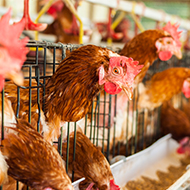Study tests impact of avian flu from cattle on mammals
The outbreak in dairy cattle has affected herds in 12 states in the USA.
An international team of researchers has found that a strain of the highly pathogenic avian influenza virus circulating in dairy cattle can induce severe disease in mice and ferrets when administered via intranasal inoculation.
The study also found that, while the virus did spread effectively between infected female mice and suckling pups through milk, the virus did not transmit efficiently between ferrets exposed to it via respiratory droplets.
The study was conducted by researchers from the University of Wisconsin-Madison, the Texas A&M Veterinary Medical Diagnostic Laboratory, and the universities of Shizuoka and Tokyo in Japan in response to the ongoing outbreak of avian flu in US dairy cattle.
The outbreak was first discovered in the USA in March this year. The virus has since been identified in herds in 12 states and four dairy workers have tested positive with mild symptoms. There have also been fatal infections in cats on farms and transmission to nearby poultry.
The researchers isolated the virus from infected cow milk and tested its ability to spread and cause disease in mice and ferrets, two species commonly used in influenza A studies. Ferrets exhibit similar clinical symptoms and immune responses to humans, providing researchers with a model of how a virus could affect people.
The study found that the virus was able to induce severe disease, and that infection can lead to systemic spread to non-respiratory tissues including the eye, mammary glad, teat and/or muscle.
The tests on the ability of the virus to spread, find that it did not do so efficiently through respiratory transmission. However, the researchers did find that the virus could bind to receptors that human influenza A viruses attach to, in addition to the receptors that avian influenza viruses attach to.
Prof Ash Banyard, a virologist at the UK’s Animal and Plant Health Agency, said: “The work by Eisfield et al uses well-established laboratory models to start to fill some of our gaps in understanding of the potential ability for the newly emerged clade of avian influenza in cattle in the US to transmit to humans.
“The data is robust and both models and approaches used are consistent with earlier studies and support the current thinking that human infection risk from this virus is low.
“This reflects what is being reported from America with only four reported human cases, all of which have been described as having only mild clinical disease with no evidence of onward spread.”
The study will be published in the journal Nature. An unedited version has been made available here to give early access to the study's findings.
Image © Shutterstock



 An Avian Influenza Prevention Zone (AIPZ) has been introduced across Wales.
An Avian Influenza Prevention Zone (AIPZ) has been introduced across Wales.